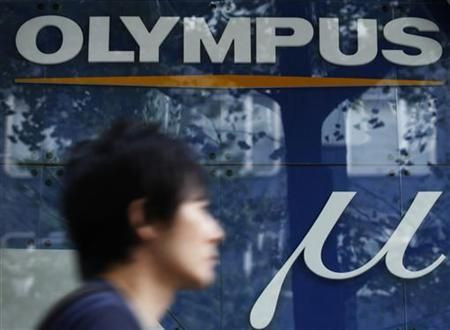Olympus Steps Closer to Stock Market Delisting

Tokyo's stock exchange warned scandal-hit Olympus Corp Thursday it will be delisted after 62 years as a publicly traded company if it fails to report earnings by Dec. 14, another blow to the Japanese camera-maker's chances of survival.
Olympus said it was unlikely to issue its earnings by an earlier Nov. 14 date, but it aimed to meet the later deadline.
The company admitted on Tuesday to a decades long cover-up of securities losses that is being investigated by authorities in Japan, Britain and the United States. Tokyo police will also look into the scandal, the Yomiuri newspaper reported on Thursday.
The report said police had asked Olympus for internal accounting documents and it would question Olympus executives to determine if financial laws were violated.
The scandal has raised doubts about the outlook of the once-venerable maker of cameras and endoscopes, and experts said the firm's only future might lie in being taken over. But potential buyers would likely steer clear until the dust settles.
Delisting does not mean it can't survive, or that it would definitely be forced to declare bankruptcy, said Hiroyuki Fukunaga, CEO of Investrust. It has lost a lot of capital but its businesses still have high value.
Potential investors can't consider buying out the businesses until all of the investigations are complete.
Olympus stunned investors on Tuesday by revealing it had used M&A deals to hide securities investment losses that the Nikkei newspaper said may have exceeded $1 billion.
Olympus has to delay its November 14 earnings announcement because its external auditor, Ernst & Young ShinNihon, will not have the information needed to sign off on the accounts, sources with knowledge of the matter said.
The auditor would want to wait for an independent panel to complete a review and the expected restatement of past earnings before signing off on its latest results, the sources said.
The Tokyo Stock Exchange said it had placed Olympus on a supervisory list and demanded the company report earnings by mid December or be delisted.
Lawyers said if the third-party panel found Olympus made material mis-statements in its accounts, delisting would be almost inevitable.
Tokyo police would work with Japan's markets watchdog, which is already investigating, and with Tokyo prosecutors, and swap information with the U.S. markets regulator and the FBI, the Yomiuri newspaper added.
Olympus was first listed in 1949 as Japan embarked on a rebuilding effort following World War Two that led to its modern day industrial might.
Its shares were untraded on Thursday because of a glut of sell orders. The shares were marked down by their daily limit to 484 yen, a decline on the day of 17 percent.
The stock has now dropped more than 80 percent since the scandal erupted on Oct 14, wiping more than $6.7 billion off the company's market value.
The stock price started falling after sacked chief executive Michael Woodford went public with assertions Olympus had improperly accounted for $1.5 billion in payments related to mergers and acquisitions.
Olympus admitted on Tuesday to using the unusual payments to assist in the cover-up.
It said the revelation came to light through the independent inquiry it had commissioned, and it blamed three senior executives. Two of those executives were former president Tsuyoshi Kikukawa and ex-vice president Hisashi Mori. Both are still directors.
SHAREHOLDERS WANT ACTION
Investor pressure has mounted for a change of management.
UK fund manager Baillie Gifford & Co, which says it holds more than 4 percent of Olympus, called on the firm to reinstate Woodford.
What Olympus needs now is a thorough clean-up and we believe Michael Woodford is the best man for the job, Baillie Gifford partner and its head of developed Asia equities, Elaine Morrison, said in a statement.
The current management of Olympus has been discredited by its original response to Mr. Woodford's allegations and its poor communications with shareholders. We expect all directors or employees linked to this wrongdoing to be dismissed and have their ties to the company severed.
The biggest foreign shareholder, Southeastern Asset Management, which has about 5 percent of the firm, has called for an extraordinary meeting of shareholders to sweep out all the remaining directors and its internal-audit board.
M&A experts and market analysts said potential buyers for Olympus, which has 70 percent of the global market for gastro-intestinal endoscopes, would steer clear until they knew what other problems might be lurking in its books.
The camera business is not profitable as a whole, but Olympus has an endoscope share that companies envy. Olympus' debt load is what could stop them in their tracks, said Fujio Ando, senior managing director at Chibagin Asset Management.
A report from Jiji news agency on Wednesday that creditor banks were considering changing conditions for their loans increased the uncertainty, although a banking source said it was too soon to consider specific action.
Olympus, founded as a pioneering Japanese manufacturer of microscopes, branched into cameras in the 1930s and two decades later expanded into gastrocameras, which became its mainstay profit earner. The Olympus group employed 39,727 people as of March this year.
(Additional reporting by Mark Bendeich, Chikafumi Hodo, Lisa Twaronite, Taiga Uranaka and Mari Saito; Writing by Linda Sieg; Editing by Richard Pullin, Edmund Klamann and Dean Yates)
© Copyright Thomson Reuters 2024. All rights reserved.





















